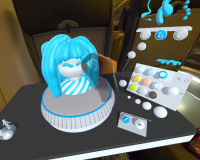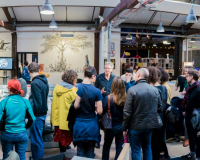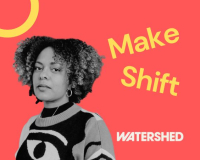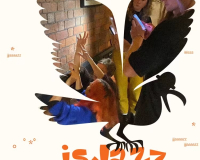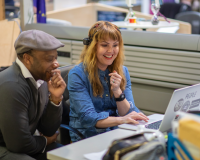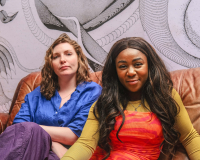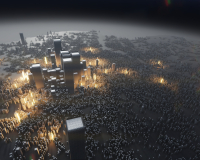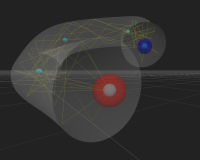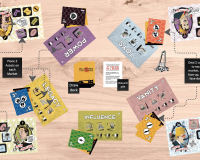Talk
Wed 25 - Thu 26 Nov 2009
mscapeFest09 in The Netherlands 25 &26 Nov!
mscapeFest is back: a two day conference for mediascape, pervasive, locative and interactive media enthusiasts, practitioners and facilitators.
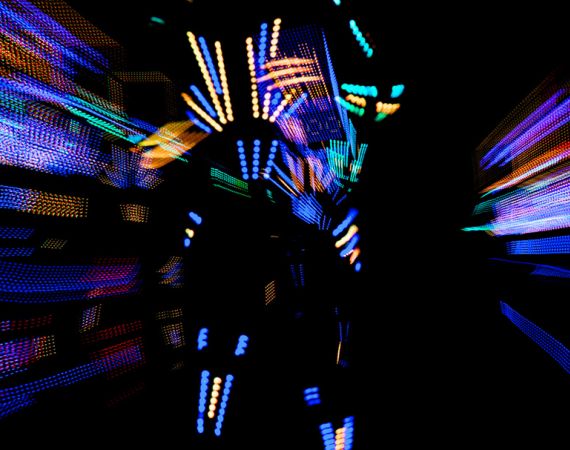
cirque bijou
Speaker
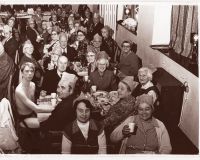
Tom Marshman
Tom’s practice honours the art of conversation and creates spaces that enable people to share their stories.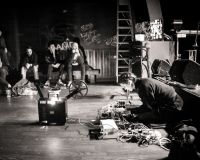
Jasmine Butt
Jasmine is a musician, synth builder and AV artist who is currently exploring modular synthesis.mscapeFest is back: a two day conference for mediascape, pervasive, locative and interactive media enthusiasts, practitioners and facilitators. Taking into consideration the growth of the community and feedback from last year, we decided to focus a little bit more on the interconnectedness of people by offering lots of discussion and networking time.
The keynote this year was Matthijs Leendertse who works as a research consultant for TNO Information and Communication Technology (http://www.tno.nl/) where he studies and advises on ICT-enabled innovation in education and media. In addition, he is scientific lecturer at the Erasmus University Rotterdam (http://www.eur.nl/english/) on media trends, strategies and policy.
A bit of history of mscapeFest: http://www.pmstudio.co.uk/project/mscapefest-2-day-annual-conference
Where?
mscapeFest is in its fourth year and is taking place in The Netherlands (Tilburg) this year. mscapeFest09 is sponsored by Fontys University of Applied Sciences, SurfNET and Kennisnet as well as the Pervasive Media Studio and Calvium. How to get to Fontys.
Public papers:
Apart from the keynote we offered 6 slots of 15 minutes (incl. Q&A) for presented papers. See last year's programme for the types of things that were presented then. This year we had a varied range of speakers, with talks ranging from mediascape experiences to engaging the public with mobile media and the future of pervasive media devices. Scroll down to download the presentations.
Programme:
Download the more detailed printed programme in PDF here.
DAY 1 - Wednesday 25 November
Beginners / drop-in
‘experts’
09.00 – 10.00
Registration + coffee
Registration + coffee
10.00 – 11.00
Opening and future of mscape by Phil Stenton
11.00 – 12.00
Introduction to mscapes lecture by Tom Melamed
Network time + chance to go out and try a local mscape. Wifi available in Fontys.
Optional:
Brainstorm session on Context based applications for the iPhone - what would you make?
12.00 – 13.00
Lunch
Lunch
13.00 – 13.45
Keynote: Matthijs Leendertse
Following the learner
13.45 - 14.00
Martijn Ketelaars
Serious gaming "the Roman mystery"
14.05 - 14.20
Jackie Calderwood
Moving Image: creating conversations across place and community
14.25 - 14.40
Anneris Tiete
Vue: researching mscape devices in the distant future
14.45 - 15.00
Tom Toebes
Using mediascapes as a didactic learning tool
15.00 - 15.20
20 minute Break
15.20 - 15.35
Presentation Pending
René van Engelenburg
Public engagement outside the museum using mobile media
15.40 - 15.55
Ben Clayton
mscape 2.6 release & the Calvium platform.
15.55 - 16.00
Quick explanation of the next 1.5 hours
16.00 - 17.00
Network time + chance to speak to all speakers, including keynote
17.00 – 19.00
Post-it session (in preparation for open space session on day 2) & Buffet and networking.
19.00 -
Everybody welcome, come and join us!
Optional drinks afterwards in Theater de Nieuwe Vorst
5 minutes walk from the train station. See map.
DAY 2 - Thursday 26 November
10.00 - 17.00 Open Space Session (click on the subjects for the key thoughts of the discussion)
1) mediascape templates for education: Brian Lamb
2) Large scale community authoring: Jo Reid
3) Which hardware to use for you mediascapes: Ben Clayton
4) How can we achieve cooperation between experts of different disciplines?: Peter Krijnen
Some interesting documentation and background reading:
- "Education is changing. Formerly, a school’s education used to last pupilsa lifetime, but today life-long learning is a key issue. Pupils are being educated to work and live in the society of the future. This society requires innovating and creative behaviour instead of standard skills and the reproduction of facts. Today knowledge is not the goal; it is a tool." Extract from 'The World as a Learning Environment'.
- The document, ‘ICT Knowledge Base’, refers to five categories with ICT subjects in which a junior teacher in secondary education must be proficient.
Questions?
Please mail Vanessa Bellaar Spruijt on mscapefest09@pmstudio.co.uk or Roel Martens on educatievedienstverlening@fontys.nl
About Kennisnet and SURFnet
The Kennisnet foundation is a public ict support organization in the Netherlands. Kennisnet encourages and supports the use of ICT in the daily curriculum of primary education, secondary education and vocational training. Our principle is: offer schools and educational institutions the right support to realize innovation in education with ICT. The mission of Kennisnet is ‘Learning to innovate with ict'.
SURFnet is the National Research & Education Network (NREN) organisation in The Netherlands. SURFnet develops and provides innovative services for education and research in the field of network infrastructure, authentication and authorisation and on-line multimedia collaboration services. Every day SURFnet provides access to these services to over one million users in higher education and research.
SURFnet is part of SURF, the collaborative organisation for higher education institutions and research institutes which are together working on breakthrough innovations in ICT.
For more than 20 year SURFnet has been one of the world’s leading research network operators. More information can be found at: http://www.surfnet.nl/en/Pages/default.aspx
SURFnet is participating in 2 projects concerning Mobile Learning:
- Make it Mobile (with Kennisnet) is a contest where teachers can send in ideas about developing mobile applications for educational use.
- Technology scout about Mobile Gadgets and testing of gadgets. This is about which mobile devices (gadgets) are useful in education and can really support the development and stimulation of mobile learning in higher education.
Last but not least, location based learning with GPS technology and augmented reality are also fields of interest for SURFnet. Read also the article about our own SURFnet Layar in computable magazine: (http://www.computable.nl/artikel/ict_topics/netwerken/3078292/1276932/surfnet-toont-hotspot-op-mobieltje.html)
Biographies
Following the Learner
Learning is shifting from being a separate activity at a fixed time and place (such as in a school) to a superfluous process that can take place during other activities as well. This requires that learning becomes context aware, and can 'go where the learner goes'. Mobile technologies can help to achieve this and can greatly benefit education. In his presentation, Matthijs Leendertse will discuss how mobile technologies can improve current learning practices, and enable new ways of learning. Rather than focusing solely on the possibilities offered by new technology, Matthijs will address the educational uses of mobile technology, its effects on learners and how the educational system can facilitate the adoption of successful applications.
Matthijs Leendertse works as a research consultant for TNO Information and Communication Technology (http://www.tno.nl/) where he studies and advises on ICT-enabled innovation in education and media. In addition, he is scientific lecturer at the Erasmus University Rotterdam (http://www.eur.nl/english/) on media trends, strategies and policy.
